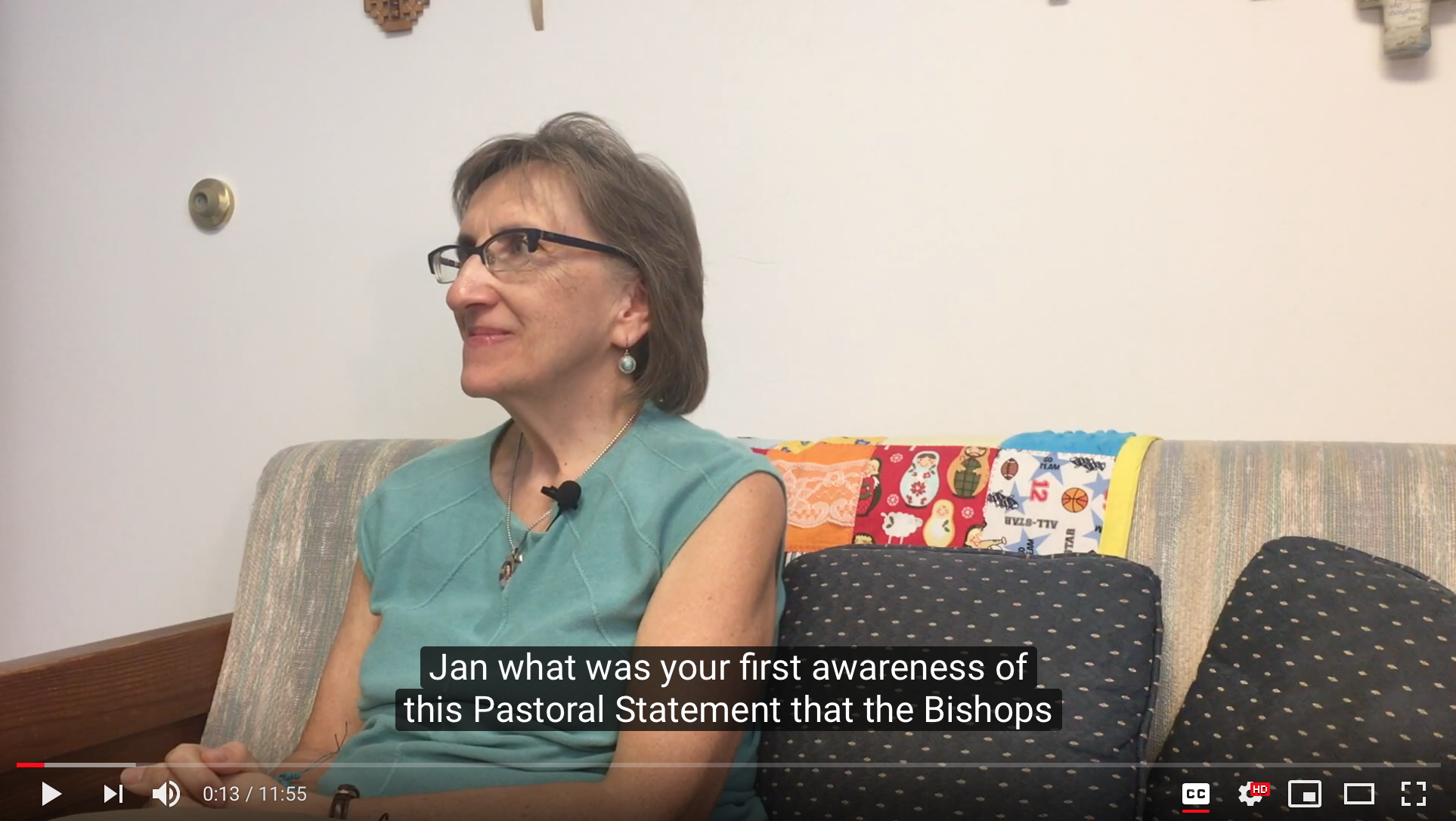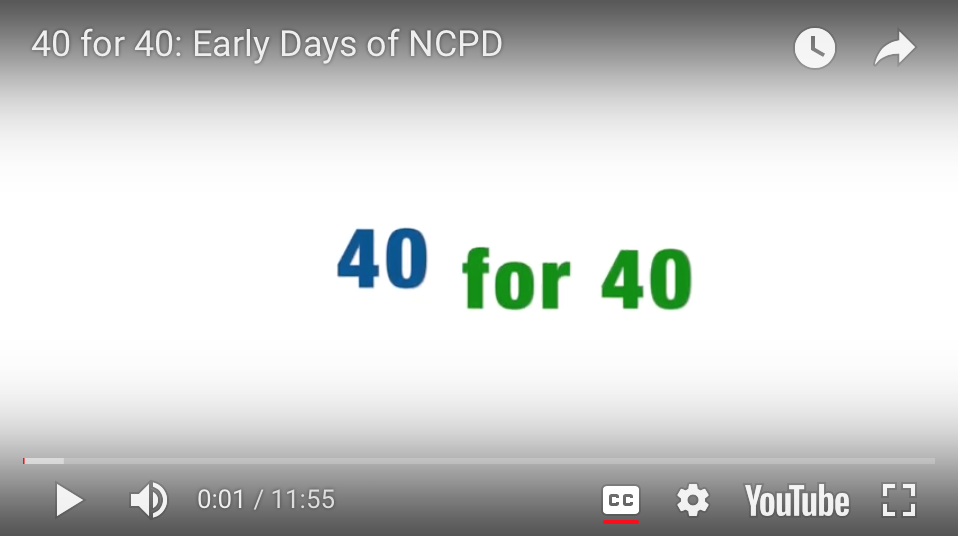See embedded video at bottom of page
Jan what was your first awareness of this Pastoral Statement that the bishops produced back in 1978 and what were you involved in at that time?
The bishops passed the Pastoral Statement on November 16th, 1978.
At the time I was still living in Michigan where I had grown up, within the Archdiocese of Detroit. I was just finishing college. I graduated December of 1978. So, I was thinking about jobs and what I would be doing. I had already been working for probably about three years volunteering but also working, getting a little stipend, for the southeast Oakland vicariate of the Archdiocese, running a faith formation program for children and then we started one for young adults with intellectual disability.
So, I was aware of what was happening at least within that Archdiocese because they had an amazing office for people with disabilities, with a lot of people who are still kind of some of our key leaders now even today; Father Bob Malloy, Maureen O'Reilly, a Sister who passed away.
So that's probably where I first heard of the Pastoral Statement because they would do trainings and I was, I often went to the trainings that they did. So, I'm sure they alerted us, and I, in the course of that next Spring, I ended up moving to DC in the summer of 1979. So, in that six months after graduating I was still doing the program trying to decide what to do. Job hunting and writing a series of articles about the ministry and what I was learning. So, I think the Pastoral Statement and what they were calling for was kind of key in those articles.
And then I moved to DC and I ended up working with a secular civil rights disability organization but that didn't stop my passion for people with disabilities and the life of faith. So, first person I actually remember meeting with here in DC was Dolores Wilson who is still a wonderful important leader in our Archdiocese of Washington here. And at the time she was a principal of Kennedy Institute which was a program of the Archdiocese and the point of contact, diocesan director for disability. So, she really helped me. I just wanted to get my bearings here and learn about what was happening and what she knew. I think I showed her the series of articles to get her impression on those.
And then I met a another friend who actually was a member of, I learned, that the bishops actually had an advisory committee on people with disabilities, which is who wrote that Pastoral Statement. And so, he nominated me to that and I was able to be, I was accepted. That was the following year in 1980. So pretty early on I was doing the secular disability rights work but then I also had a chance to wed that passion for faith and disability as well.
So, when I went to that first meeting it was held through the U.S. Conf. ... it wasn't even called USCCB at the time, it was two separate, it was U.S. Catholic Conference, and then there was a National Conference of Catholic Bishops. So, but it was all you know, in the same building, and all, and they were the ones, it was that advisory committee that met a couple times a year. So, I went to that first meeting and my good friend who I already mentioned, Fr. Bob Malloy, who I had known in the Archdiocese of Detroit, was on that committee. So I felt a little at home. I didn't feel quite so out of place not knowing anybody.
But these were leaders from all around the country. It was very exciting. Because that's important to know I think. That that there were two, I have always called them sister organizations, who preceded NCPD. National Catholic Office for the Deaf, and an organization that had four name changes, but I think at the time it was the National Apostolate for People with Mental Retardation. So the work that was being done in the dioceses and funded by, often by the Knights of Columbus, even back then very generously, was primarily focused on catechesis for people with intellectual disabilities, which at the time was called mental retardation, and the Deaf community.
So you had leaders, pastoral workers, grassroots people, all around the country, kind of working in that, as well as family members, as well as the people with disabilities themselves. So, there was some movement. There was a wonderful group called the Victorious Missionaries, which was a great group that worked, that had membership chapters of people with physical disability. And even before any of these three, there was, there was CUSA ,which was at the time the Catholic Union of the Sick in America. And it's still going strong today, too. And it was like a support group. And they just kept in touch with each other through letter-writing and now they have email groups too.
But, so there were some wonderful ministries already that preceded it, and it was out of those ministries, and those pastoral leaders, and those family members, who just said to the bishops, "You need to address the needs of people with disabilities." And they agreed. And in 1975 established that Advisory Committee on people with disabilities. Of course, at the time it was probably called the handicapped. You know language is fluid and has changed over the years and the decades. But, so, by the time I got there in 1980, a major work that they had done was get the Pastoral Statement written and approved by the bishops. And I think that Pastoral was really, really earth-changing for people because it was an affirmation, by, an official affirmation by the bishops of the work that they've been doing for so long and believed in for so long.
And I realize I had missed another organization that's important, and that's SPRED. Special Religious Education, out of the Archdiocese of Chicago, is where they were based. And they too were doing a lot of the work. A lot of the catechetical work. And training some of these leaders from around the country. As was the Sisters, the Franciscan Sisters who worked at Cardinal Stritch University. They had a Master's Degree program in Special Religious Ed.. And some of the leadership who worked for decades in this ministry were trained thanks either through SPRED or through Sr. Coletta Dunn, Sr. Gabriel Kowalski and Sr. Sheila Haskett. So, I wanted to thank them because it was these amazing leaders all around the country who made such a difference.
So, part of what the Advisory Committee then did, and again we just went to these occasional meetings, but was set up a national, one of the first national conferences, to draw everybody together, in Niagara Falls. And I think that was either in the Fall of '80 or '81. I'm sorry I don't know that off the top of my head. I know that I wasn't able to attend because of the work I was doing. But I know that that was a really good important conference because it drew people together to meet one another and network and brainstorm. And I think one of the outgrowths, so it might have been in 80, was, and one of the things that the Advisory Committee members also really wanted was a national office that represented all disabilities. We had these wonderful organizations that were working very strongly, as I mentioned, with other uni-disabilities or like as a support group like the Victorious Missionaries, but they wanted one, an organization, national, Catholic, that would address all disabilities and all ages and really implement that Pastoral Statement and bring it to life in all the dioceses of the United States.
And, so that was a dream and a goal. There was a little bit of tussle among even the members, some of whom said we should actually just really push to try to be an office within the Bishops Conference. So, there was some of that as well, debate and consideration. But as it turns out we were given a grant. And I do remember that meeting when I was sitting at the table, and we were all at the table, and in came smiling, the Chair, Monsignor Thomas Cribben, who was from the Diocese of Brooklyn, wonderful man from Catholic Charities, and David Byers who was the staff liaison for the Bishops Conference, and did a lot of the writing of the Pastoral Statement. And again he's still involved, which is so amazing, and he's right here in our Archdiocese, and is actually going to be a keynoter at a conference that we're doing in November, a symposium. So, we've been blessed to maintain that friendship and collaboration with Dave all these years. Monsignor Cribben has since passed away, as have some of our other key pioneers and leaders. But they came in just smiling and beaming because unbeknownst to us the executive committee had written a grant to the American, what was then called the American Board of Catholic Missions, now the Committee on Home Missions, but, and had gotten the seed money for us to start a national organization.

So, just as soon as we were getting started, we were, at least for me, for me being part of the committee, it was disbanded because of the good news that NCPD was going to be formed. Of course we didn't know what it would be called at that time. But, so that was part of the work of the advisory committee, was to consider, you know, and get this set up and get it incorporated.
And so the, it was a quite a big committee. The executive committee of the bigger Advisory Committee, became NCPD's first Board of Directors. And that was November of '81. May, March, April, May of 82 they met again. The, probably the executive committee at that point. It was just the executive committee, because as I said, they'd been disbanded.
But since I was in DC, I went over to where they were going to have Mass and lunch just to see everybody again and say hello. Happened to be the day they were interviewing for their new executive director which is when I met Sr. Rita Baum. And she was selected as the director. She was, had been, doing the ministry in the Diocese of St. Augustine and one of the Bishops, Jack Snyder from from that diocese, knew Sr. Rita, and who recommended her. So, I met her and then I wrote a letter and said I'd love to work with you, and that's how we began. So while she was closing down the work she was doing in Florida I was finding office space and getting the office incorporated and working. And she came in August of 1982 and we were formed.

